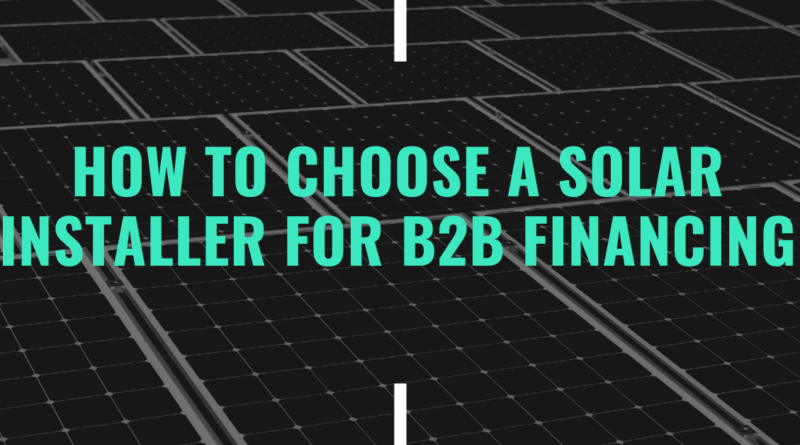How to Choose a Solar Installer for B2B Financing
Choosing the right solar installer for your business-to-business (B2B) financing needs is a critical decision that can significantly impact the success and efficiency of your solar energy project. This comprehensive guide aims to provide you with all the necessary information to make an informed choice, covering various aspects such as experience, accreditation, financial stability, and customer service.
Understanding the Basics of Solar Installation for Businesses
Before diving into the selection process, it’s essential to have a basic understanding of solar energy systems and how they can benefit your business. Solar power can reduce energy costs, provide a reliable power source, and enhance your company’s green credentials. However, the effectiveness of these benefits largely depends on the quality of the solar installation and the installer’s expertise.
Types of Solar Energy Systems
Photovoltaic (PV) Systems:
Convert sunlight directly into electricity.
Solar Thermal Systems:
Use sunlight to heat water or air for various applications.
Components of a Solar Energy System
- Solar Panels
- Inverters
- Mounting Systems
- Electrical Systems
- Monitoring Systems
Criteria for Choosing a Solar Installer
Selecting the right solar installer involves several critical criteria that ensure you partner with a reliable, competent, and financially sound company.
Experience and Expertise
Years in Business:
Look for companies with a proven track record in the solar industry.
Project Portfolio:
Review their past projects, especially those similar in scale and complexity to yours.
Technical Expertise:
Ensure they have experience with the latest solar technologies and can offer customized solutions.
Certifications and Accreditations
Industry Certifications:
Check for certifications from recognized industry organizations such as the North American Board of Certified Energy Practitioners (NABCEP).
Licenses:
Ensure the installer has all necessary local, state, and federal licenses to operate.
Financial Stability and Financing Options
Financial Health:
Investigate the installer’s financial stability to ensure they can support your project from start to finish.
Financing Solutions:
Look for installers who offer flexible financing options, including leases, power purchase agreements (PPAs), and loans, tailored to B2B needs.
Customer Service and Support
Customer Reviews:
Read customer reviews and testimonials to gauge their satisfaction levels and the quality of service provided.
Warranty and Maintenance:
Check the warranties offered for equipment and workmanship and inquire about their maintenance and support services.
The Selection Process
Finding the right solar installer requires a structured approach. Here’s how you can go about it:
Conduct Thorough Research
Start by creating a list of potential solar installers that specialize in B2B projects. Use online directories, industry associations, and referrals from other businesses to compile your list.
Request Proposals
Contact each installer and request a detailed proposal. The proposal should include information about the project scope, timeline, costs, equipment to be used, and financing options.
Evaluate Proposals
Carefully evaluate each proposal against your criteria. Consider the total cost, potential energy savings, quality of proposed equipment, and the installer’s expertise and experience.
Conduct Interviews
Interview the top candidates to discuss their proposals in detail. This is also an opportunity to assess their professionalism and the quality of their customer service.
Check References
Contact references provided by the installers to verify their claims and inquire about their overall experience, including any challenges faced and how they were resolved.
Read More: 50 Exciting Summer Jobs for Students in 2023
Red Flags to Watch Out For
While evaluating solar installers, be mindful of certain red flags that could indicate potential problems:
Lack of Transparency:
Be wary of installers who are not forthcoming with information or who provide vague answers to your questions.
High-Pressure Sales Tactics:
Reputable installers will give you time to make an informed decision rather than pressuring you into signing a contract.
Unusually Low Bids:
While competitive pricing is important, significantly lower bids may indicate cutting corners or a lack of experience.
Finalizing Your Decision
Once you’ve conducted thorough research, evaluated proposals, and checked references, you should have enough information to make an informed decision. Choose the solar installer that best meets your business needs, offers the best value, and has a solid track record of successful B2B projects.
Negotiate Terms
Work with your chosen installer to negotiate the terms of the contract, including the project timeline, payment schedule, warranties, and maintenance agreements.
Plan for the Future
Consider your long-term energy needs and discuss potential expansions or upgrades with the installer. A good solar partner will help you plan for the future and ensure your energy system can grow with your business.
Read More: Best Dental Schools in US in 2024
Conclusion:
Choosing the right solar installer for B2B financing is a crucial step in transitioning your business to solar energy. By following the guidelines outlined in this article, you can ensure that you select a reliable, experienced, and financially stable installer that will provide a high-quality solar installation tailored to your business needs. Remember, the right partnership will not only help you achieve your immediate energy goals but also support your business’s growth and sustainability initiatives in the long run.
